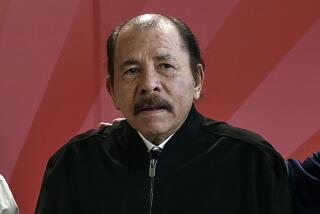U.S. Cites Rights Abuses in Philippines
- Share via
WASHINGTON — The State Department, in its annual survey of human rights practices around the world, Thursday cited “serious” violations throughout the Philippines, including summary executions and torture by national security forces.
The report also said that Communist rebels in the Philippines “stepped up significantly their use of terror, including summary executions, as a tactic in furtherance of their political objectives.”
Attention focused on the Philippines because of its hotly disputed Feb. 7 election, marred by evidence of massive fraud. But the section on the Philippines took up just 18 of the report’s 1,440 pages detailing the 1985 political climate in 164 countries.
The department said that the accuracy of statistics on human rights abuses in the Philippines “is highly questionable.” Nevertheless, it said, “there were frequent reports, many of them well-founded, of human rights abuses, especially in the countryside, by government security forces. These included summary executions . . . instances of torture, arbitrary arrests, detentions, unlawful searches and seizures and disappearances.”
The report also found some positive developments, including “toleration of peaceful expressions of political dissent . . . and the trend toward greater press freedom.”
Richard Schifter, assistant secretary of state for human rights, said, “There is no doubt in the minds of all of us that in the Philippines, there is an infrastructure on which democracy can be built.”
Schifter told reporters that, “in terms of large numbers of deaths,” the worst deterioration in human rights had occurred in Ethiopia, where the government has forcefully resettled an estimated 500,000 people away from areas of extreme drought. He said that “tens of thousands” of people died, either during or after their trips to government relocation camps.
Turning to Democracy
The most hopeful region of the world, Schifter said, is Latin America, where many nations “have in recent years turned from dictatorship to democracy and in doing so have increasingly emphasized the observance of all human rights.”
The report sharply criticized Nicaragua’s government for political killing, torture, intimidation of political opponents and various other abuses, including the rape of women prisoners by government security guards. But the report also repeated charges by the Nicaraguan government and independent human rights organizations such as Americas Watch that U.S-supported contras (rebels) also have engaged in torture and summary executions.
Rep. Gus Yatron (D-Pa.), chairman of the House Foreign Affairs subcommittee on human rights and international organizations, protested that the report disregarded poor human rights conditions in countries friendly to the United States and instead concentrated on such countries as Vietnam, Cambodia, the Soviet Union and Cuba.
Double Standard Charged
“The State Department’s human rights reports reflect this Administration’s double standard on U.S. human rights policy,” Yatron said.
Schifter denied any double standard, although he added: “We do have a point of view. We believe in democracy. We do not believe in repression, and we certainly don’t believe in ideologies that employ repression.”
He said that the human rights situation is improving in Marxist Yugoslavia. But as for the Soviet Union, he said, “the situation is not as good as it was even under (former President) Leonid I. Brezhnev.”
The report marked the 10th anniversary of the U.S. policy of reporting yearly on the human rights situation in every country in the world.
More to Read
Sign up for Essential California
The most important California stories and recommendations in your inbox every morning.
You may occasionally receive promotional content from the Los Angeles Times.













